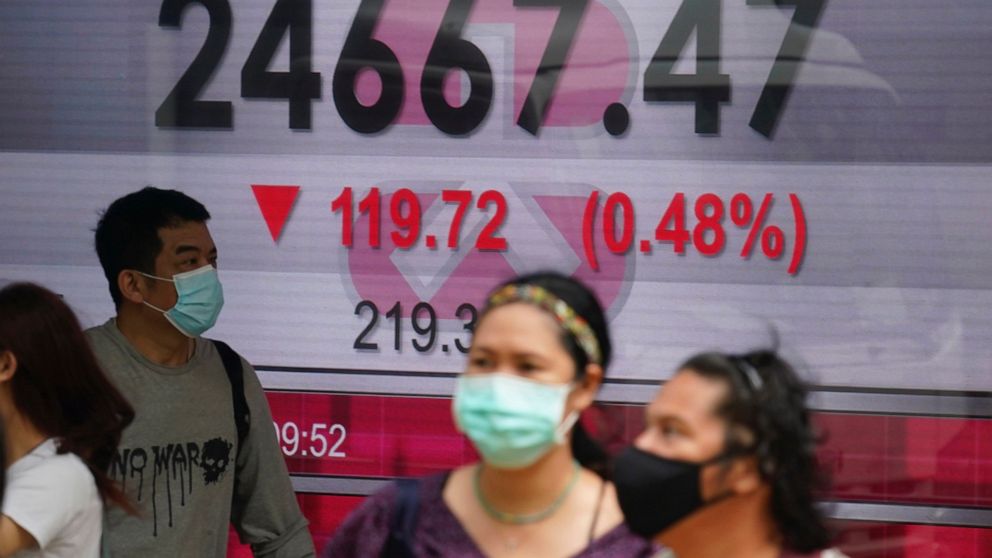Losses deepen for stocks, sending S&P 500 down more than 2%
Stocks around the world are tumbling Wednesday on worries the worsening pandemic will mean even more restrictions on businesses
NEW YORK — Stocks around the world are tumbling Wednesday on worries the worsening pandemic will mean more restrictions on businesses and drag down the economy.
The S&P 500 slumped 2.7% in morning trading on Wall Street, heading for a third straight loss. It’s already down 4.8% this week, threatening to post its biggest weekly fall since March. That’s when the market was in the midst of selling off as strict lockdowns around the world choked the economy into recession.
The Dow Jones Industrial Average was down 777 points, or 2.8%, at 26,685, as of 10:30 a.m. Eastern time, and the Nasdaq composite was 3.1% lower. The selling was widespread, and close to 95% of stocks in the S&P 500 were lower.
Markets were dropping even more sharply in Europe, where investors expect the French president to announce tough measures to slow the virus’ spread and Germany’s chancellor is pressing for a partial lockdown that could include the closures of bars and restaurants. The measures may not be as stringent as lockdowns that swept the world early this year, but the worry is they could still hit the global economy when it is already so weakened.
Policymakers in Europe “must choose between low unemployment or low COVID transmission rates. Unfortunately, they are now left dealing with the most sensitive currency of them all, people’s lives,” Stephen Innes of Axi said in a report.
In European stock markets, Germany’s DAX lost 3.9%, and France’s CAC 50 dropped 3.4%. The FTSE 100 in London fell 2.7%.
Coronavirus counts are also rising at a troubling rate in much of the United States. Even if the most restrictive lockdowns don’t return, investors worry that the worsening pandemic could scare away customers of businesses regardless and sap away their profits.
Stocks of companies that most need the virus to abate for their businesses to get back to normal were slumping to some of the sharpest losses. Cruise operators Carnival, Royal Caribbean and Norwegian Cruise Line Holdings all dropped at least 4%.
Crude oil also tumbled on worries that an economy already weakened by the virus would consume even less energy and allow excess supplies to build higher. Benchmark U.S. crude dropped 5.6% to $37.34 per barrel. Brent crude, the international standard, fell 5.1% to $39.48 per barrel.
That helped send energy stocks in the S&P 500 to a loss of 4.2%, the largest among the 11 sectors that make up the index. Every one of them was weaker.
Instead, investors headed into the safety of U.S. government bonds. The yield on the 10-year Treasury note fell to 0.75% from 0.79% late Tuesday. It was as high as 0.87% last week.
A measure of fear in the stock market touched its highest level since June, when the market suddenly tumbled amid concerns that a “second wave” of coronavirus infections had arrived. The VIX measures how much volatility investors expect from the S&P 500, and it climbed 17.4% in Wednesday morning trading.
Even the continued parade of better-than-expected reports on corporate profits for the summer failed to shift the momentum.
Microsoft, the second-biggest company in the S&P 500, reported stronger profit and revenue for its latest quarter than expected. That’s typically good for a stock, but Microsoft nevertheless slumped 3.6%. It gave a forecast for the current quarter that was relatively in line with Wall Street forecasts, but analysts noted some caveats in it.
UPS fell 5.7% after also reporting better-than-better earnings, though it said the outlook for its business is too cloudy due to the pandemic to offer any forecasts for its revenue or profits in the current quarter.
Among the few winners was General Electric, which jumped 8.4% after reporting stronger profit and revenue for the latest quarter than expected. Automatic Data Processing rose 6.5% after its profit report also topped expectations.
Companies broadly have not been getting as big a pop in their stock prices as they typically do after reporting healthier-than-expected profits. Analysts say that suggests good news on profits has already been built into stock prices and that the market’s focus is elsewhere, such as in Washington.
Hopes that Congress and the White House could soon offer more big support for the economy as it struggles through the pandemic have largely faded. House Speaker Nancy Pelosi and Treasury Secretary Steven Mnuchin have continued their talks, but investors see little chance of a deal happening before Election Day next week.
Economists say the economy likely needs such aid after the expiration of the last round of supplemental unemployment benefits and other stimulus approved by Washington earlier this year.
Uncertainty about the upcoming presidential election has also been pushing markets around.
In Asian stock markets, trading was mixed. Japan’s Nikkei 225 fell 0.3%, and Hong Kong’s Hang Seng also lost 0.3%. South Korea’s Kospi gained 0.6%, and stocks in Shanghai rose 0.5%.
———
AP Business Writer Yuri Kageyama contributed.
![]()


